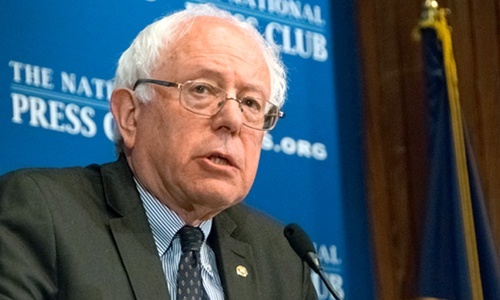

3. He Filibustered the Extension of the Bush Tax Cuts
In 2010, as the Senate considered the extension of the Bush tax cuts in a complicated lame-duck legislative maneuver, Sanders stood against extending the tax breaks for people making over $250,000—literally stood, for 8.5 hours, as he patiently explained the injustice of giving tax breaks to the wealthiest as the middle class struggled and wages stagnated. The tax package passed anyway, but Sanders helped set the opposition to the upper echelon of the Bush tax cuts that were finally nixed in 2013.
Sanders’ filibuster was notable for another reason; his marathon speech came in the midst of the Senate GOP’s use of the cloture filibuster, requiring 60 votes to bring a bill to discussion, which effectively ground the Senate to a halt for much of Obama’s presidency. The use of “filibusters” ballooned during this period, accounting for more filibusters than in the decades preceding it combined. But until then not one Republican actually stood up and did a real one. Sanders did.
4. He Caused Republicans to Run in Fear over a Climate Change Amendment
Tired of Republican politicians’ “I’m not a scientist” escape hatch in response to questions about the existence of climate change, Sanders devised a way to force senators to say yes or no. He proposed an amendment to the Keystone Pipeline legislation. Sanders’ “sense of Congress” resolution would have forced senators to vote on whether:
“One, climate change is real. Two, climate change is caused by human activity. Three, climate change has already caused devastating problems in the United States and around the world. And, four, it is imperative the United States transform its energy system away from fossil fuels and toward energy efficiency and sustainable energy.”
The amendment so scared the Senate GOP that it managed to squelch the thing, even after Senate Majority Leader Mitch McConnell (R-KY) had said he was open to any and all amendments on the pipeline bill.
Sanders has been active on climate change in the Senate, but the chamber has not jibed with his sense of urgency. In 2013 Sanders and Senator Barbara Boxer (D-CA) introduced what they called a “gold standard” climate change bill, taxing carbon emissions to pay for a massive expansion in green energy industries while ending loopholes for fracking. The bill didn’t “settle for half-measures, but rather [laid] out an actual solution to the climate crisis.” Too ambitious for Congress, however, the bill died, and the Senate’s unwillingness to confront climate change only worsened with the 114th Congress that knocked the Democrats out of the majority.
Nonetheless, Sanders’ record on climate change looks to be one of the major selling points of his campaign. If he won’t win the nomination, he can influence the debate, in part by framing climate change as a primary issue. Sanders once co-authored a bill with then-Senator Hillary Clinton on stimulating green job creation, and as Clinton’s main liberal rival he’d be perfectly placed to press her on the issue at a time when the frontrunner is backing off of controversial policy positions.
5. He’s Keeping Hillary Clinton Honest on Trade
That’s not the only way a Sanders campaign could impact the Democratic primary. Sanders is liberal enough—and blunt enough—to keep Clinton honest on a range of issues, most recently the Trans-Pacific Partnership, a trade deal pitting progressives and organized labor against the centrist Democratic wing, including President Barack Obama.
It’s the exact fight a candidate like Clinton, a centrist seeking to woo the left, dreads. Clinton has studiously avoided taking a position on the trade deal for fear of alienating either wing of her party before her campaign gets under way in earnest. Sanders won’t let her get away with this. “You are either for it or you’re against it,” he said on CNN’s State of the Union last Sunday. “No fence-sitting on this one.”
6. He’ll Make Overturning Citizens United a Litmus Test
Sanders has been one of the most vocal opponents of Citizens United, which unleashed hundreds of millions of dollars in outside campaign spending. As usual, his advocacy extends far beyond press releases and into action. Where every other 2016 candidate is tripping over him or herself to found a super-PAC, Sanders is going without one. “I am not going to start a super-PAC,” he declared. “I’m not going to go around the country talking to millionaires … We’re looking at a system where our democracy is being owned by a handful of billionaires.”
Not engaging in the campaign finance arms race is a major handicap, especially when Sanders will be going up against one of the best-financed candidates in electoral history in Hillary Clinton. Nonetheless, the donations came pouring in following his announcement, and Sanders posted $1.5 million raised from over 35,000 donors, a number that almost tripled in the following fortnight. And where GOP candidates are relying on the multimillion-dollar contributions of Wall Street investors, casino magnates and the Koch brothers, Sanders’ can boast an average contribution of $43. That’s not the type of money that buys you an election, but it is the kind you can brag about on the campaign trail.
Sanders is so committed to reversing the effects of Citizens United, he’s declared that a willingness to overturn it will be litmus test for any potential Supreme Court nominee. Here he’s already having his desired effect on the race: days later, Hillary Clinton announced she would implement that test, too. Clinton may have the money and the press, but so long as Sanders is around, he may be setting her policy.
YOU MIGHT ALSO LIKE
President Obama: Climate Change Is an ‘Immediate Risk to Our National Security’

 233k
233k  41k
41k  Subscribe
Subscribe 